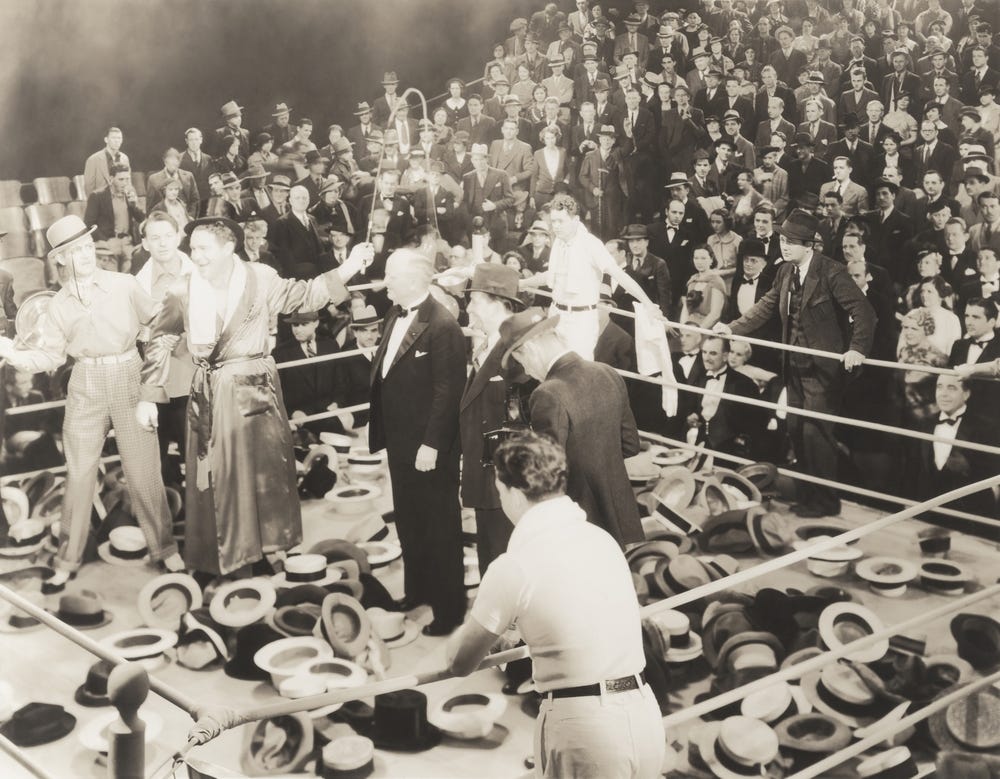Massachusetts prepares for take off
Massachusetts launch, Kentucky bill, Park Lane Club sale, UKGC speech, marketing communications fines +More
Good morning and welcome to the debut edition of Compliance+More. We’ll be sending updates on all things gambling regulation and related matters around sports integrity, tokens and payments on a regular basis, starting with two editions a week.
In today’s issue:
Massachusetts prepares for a retail and online sports-betting launch.
Kentucky gets the ball rolling.
Administrators request another year to sort Park Lane sale.
UK Gambling Commission deputy CEO offers advice to her Danish counterparts.
The lightning rod: marketing communications in Ohio’s sights.
If you were forwarded this newsletter and would like to subscribe directly, click below:
Massachusetts launch
Retail betting will launch at 10am on January 31, with OSB to get the go-ahead before March Madness.
More grill marks than a high-end steakhouse: If operators thought the Massachusetts Gaming Commission would rubber stamp their sports-betting licenses, they were sorely mistaken. MGC mobile sports-betting hearings have been multi-day affairs, with operators confronted fielding some uncomfortable responsible gaming and DEI questions that went well outside their prepared PowerPoint presentations.
The MGC’s thoroughness has led to several first-of-their-kind concessions from operators, including:
Mandating operators set specific DEI and responsible gaming goals and action plans.
Citing concerns from other legal jurisdictions, the MGC applied pressure that led to several concessions around marketing.
These include promises not to partner with colleges and universities, the implementation of age-verification protocols at live events and guidance on the use of the term ‘risk-free’ in promotions.
Bite/bark: The MGC has also been relentless when it feels an individual, brand or activity connected to the product is problematic. The resumes of Dave Portnoy (Barstool/Penn Entertainment), Craig Carton (FanDuel) and Jake Paul (Betr) were pored over by MGC commissioners.
However, despite remonstrations from commissioners, every applicant that has appeared before the MGC has received a temporary (1 year) license – Betr was the only applicant not unanimously approved, receiving a 4-1 vote.
The remaining retail licenses to be decided upon are the Raynham Park (including the bet365 OSB tether) and Suffolk Downs racetracks. They are yet to participate in hearings.
Zooming out: A question being posed by the Massachusetts style of licensing hearing is: whether this might become the new norm for states that have yet to legalize or is the Bay state an outlier in its vetting process?
State regulatory bodies can be competitive, and every state wants to be seen as the ‘gold standard’ of regulation. Right now, Massachusetts is making a solid claim for the title.
Read more on the trend towards tougher regulations here: Regulators Are Getting Tough On Sports Betting Operators
Launch countdown: The MGC has set a launch date for Tuesday, January 31, at 10am for retail betting at the three MA casinos: Plainridge Park, Encore Boston Harbor and MGM Springfield. The mobile launch date is still up in the air, but is expected to occur sometime in early March.
The 11 Mobile operators approved by the MGC are: Barstool, WynnBet, BetMGM, Caesars, Bally Bet, PointsBet, Betr, Fanatics, Betway, FanDuel and DraftKings.
** SPONSOR’S MESSAGE ** Odds On Compliance is a technology and consultancy firm specializing in sports betting, iGaming, gambling compliance, and regulatory frameworks. We assist in navigating and staying up-to-date with rapidly developing regulatory compliance frameworks at state and federal levels. Our flagship product Playbook features carefully curated and updated statutes, regulations, and requirements enabling businesses to stay in step with the regulatory agencies. Visit www.oddsoncompliance.com.
Kentucky gets the ball rolling
Kentucky throws its hat into the ring with a bill that would legalize retail and OSB, DFS and online poker.
Problematic: There are several problems with HB 106 as proposed: it’s a Democrat-sponsored bill in a legislature with Republican supermajorities in both chambers and gambling is a sensitive topic in Kentucky, and HB 106 seeks to legalize three forms of the activity. That could be a bridge too far for some lawmakers. More importantly, there are structural hurdles that will hinder Kentucky’s foray into online gambling.
It is an election year with a divided government and the Republican supermajorities in the House and Senate are not going to want to give Democrat Gov. Andy Beshear any legislative wins.
Religious objections. A coalition of 2,400 Baptist churches in Kentucky is vowing to stand strong against expanded gambling.
“Kentucky already struggles with drug addiction and it is immoral for the state to encourage another form of addiction – sports betting.” said Todd Gray, executive director-treasurer of Kentucky Baptist Convention.
Lastly, it is the home state of Churchill Downs and, in Kentucky, what Churchill Downs wants, Churchill Downs gets. Its stance regarding the bill is not yet known.
News from the Great Plains
Nebraska has yet to launch sports betting (authorized way back in May 2021), but that isn’t stopping lawmakers from tinkering with its yet-to-be-launched sports-betting industry. Enter LB 168, a bill that would tweak the law to allow for in-state college betting.
North Dakota pols are considering a constitutional amendment on the 2024 ballot asking North Dakotans to expand sports betting beyond tribal casinos.
Book closes on Genesis
Malta and Sweden suspend the license of troubled online casino operator Genesis Global.
That’s all folks: The Swedish Gambling Authority confirmed to C+M it has revoked Genesis’ gaming license after becoming aware of the company’s bankruptcy, following the Malta Gaming Authority’s suspension of the firm on the basis it can no longer trade.
Months after a £3.8m fine for multiple compliance failings, Genesis pulled out of the UK market on December 6.
Co-founder and CEO Ariel Reem left days later, noting on LinkedIn it was time to “move on to the next challenge” without referencing the dire state of the business.
After filing for bankruptcy in Malta, Genesis fired all of its staff and said it had no money for December’s salaries or any severance payments.
Land of confusion: All eyes are now on Spain, where Genesis is still registered despite having no Maltese support staff to handle enquiries, deposits or account issues.
Park Lane administration
Administrators have been granted another year to sort out the financial mess that is the Park Lane Club casino following its sale last year to Playboy Club owner Metropolitan Gaming.
Pay the man: Turnaround specialists Begbies Traynor have named the creditors holding £5.4m worth of unpaid bills since the once high-flying London casino fell into administration in June 2022. Most won’t see a penny, Begbies warned, and that may include 200 out-of-pocket punters.
Begbies disclosed that HMRC was probing Park Lane prior to the collapse in relation to marketing and is continuing to do so alongside the Gambling Commission.
A review of the business with a view to sell was started in January 2021, but, following the insolvency, Begbies have another 12 months to right the ship, C+M understands.
Messy business: The casino was fined £1.9m in 2019 for anti-money laundering violations, with a promise by self-proclaimed Park Lane savior and Geneva-based investment banker Riccardo Tattoni that he would clean up compliance operations. But after he failed a source of funds check he was eventually refused a license.
Previous owner Vasilijs Melniks, a former Latvian politician, is still wanted by Ukrainian prosecutors who froze $144m of his assets over corruption charges.
The Commission’s take on what constitutes a politically exposed person has been repeatedly questioned, but the regulator refuses to explain how or why it ever issued a license to Melniks, despite the matter having been brought up in Parliament.
Playboy of the western world: Around 90 parties were interested in buying Park Lane, but the lack of a license eliminated all Playboy Club owner Metropolitan Gaming which offered £9.5m. It has matters to square off with the Gambling Commission, however, given its own casino operating license is still in limbo. It has been rebranded as the Metropolitan Mayfair.
Sources suggested the Commission has not as yet approved its 2021 acquisition of Caesars, which copped a £13m penalty in 2020 for “serious” license violations.
High-end lows: Grosvenor casinos operator Rank said last summer the London casino market continues to suffer from difficult trading conditions. Others are faring worse: Palacegate, formerly known as Maxims, is also in administration having closed during the pandemic and its license is currently frozen.
The Playboy Club itself remains shuttered; while the Ritz Club closed in 2020, with its license later bought by Hard Rock.
Gardner questions
The deputy CEO of the UK Gambling Commission offers lessons to her Danish counterparts.
Regulator shall speak unto regulator: In a speech at the Danish Gambling Authority’s industry day, Sarah Gardner from the UKGC said she had come to “bang the drum” for greater collaboration.
“That both jurisdictions are looking to review key parts of their regulatory regime underlines the importance of constant innovation and improvement,” she said.
She added that ~50% of Danish-licensed operators are also licensed in the UK
“In a world where many of us have the same companies, operating at the same scale, offering the same products, why shouldn’t we share notes on how they are performing?”
Straw man: More controversially, Gardner made mention of “an argument sometimes made” in the UK that the scale of unregulated gambling meant the regulator should “scale back or stop” its rate of interventions lest it encourage more consumers to seek out black market alternatives.
🤷But while she said she “cannot accept” this argument, she later went on to state that, due to regulatory changes on VIPs and high-value customers, their number had fallen by 70%.
Gardner added that while the UKGC has a “level of concern” about illegal online gambling “we have no time for those risks being overstated, without credible evidence, either”.
Fines
On succeeding days last week, the UK Gambling Commission announced regulatory settlements with first Vivaro, the B2C arm of BetConstruct and operator of VBet, and then TonyBet, after investigators uncovered AML and safer-gambling failings.
Vivaro’s settlement comes to £337,631, while TonyBet will pay £442,750.
Social reaction: Taking to LinkedIn to give a reaction to Vivaro’s £338k regulatory settlement, Melanie Ellis from Northridge Law was damning:
Pre-emptive strike: “Essentially what the GC seems to be saying… is that a customer's bank balance should be assumed to include deposits from criminal spend until proven otherwise.”
Further reading: Scott Longley for EGR in December on UKGC CEO Andrew Rhodes’ attempt to build bridges with the industry.
Ill communications
Marketing is often the lightning rod for consumer disquiet over online gambling.
Risk off: The Ohio Casino Control Commission has hit Caesars with a $150k fine after an affiliate promoted ads on Twitter that used the term 'risk free’. BetMGM and DraftKings are both awaiting their own hearings, while Penn/Barstool was also fined $250k ahead of market launch.
Meanwhile, the Massachusetts gaming commissioners have also suggested they will strictly police sports-betting advertising when the market opens.
AGA senior vice-president Casey Clark told C+M that the gaming industry’s “longstanding commitment” to responsible gambling was true in Ohio as with other states.
“Our members will continue to work to exceed regulatory expectations as Ohio’s sports- betting market matures and more bettors migrate to legal channels,” he added.
County lines: Analysts at EKG noted it appeared “increasingly untenable” for operators to expect to be able to push responsible-gambling messaging in one state and not another, while Regulus said Ohio’s moves “demonstrated a refreshingly different approach”. The team added that “tellingly” the breaches in Ohio were “all obvious to the casual observer”.
“The US market needed an Ohio moment to deliver long-term sustainability,” said Regulus.
“But the scale of regulatory disruption likely to impact licensees across the US in the next year or so should not be underestimated.”
Echoes: There are resonances with the experience in Europe where fines over marketing messaging mistakes are well-documented. In the UK, the largest sanction came in March last year when Sky Betting & Gaming was fined £1.17m for sending promotional emails to customers who had self-excluded or who had opted out of marketing.
In the Netherlands, the lottery operator TOTO was fined €400k for marketing its product to young adults.
In Italy, meanwhile, the communication authority fined tech giant Google €750k in August for allegedly breaching the ban on gambling advertising on its YouTube video platform.
** SPONSOR’S MESSAGE ** Department of Trust's mission is to turn affordability, AML, EDD and safer gambling checks from being a challenge which erodes trust, consumes resources and complicates operations into a value-add which enhances your relationship with your customers and supports your business. That's why we're proud to have such strong support from players and operators alike. Visit: www.dotrust.co.uk/
Europe notebook
Ducks in a row: Operators in Sweden will need to start thinking about the renewal of their licenses at the end of this year and should consider getting the paperwork done well in advance, suggested the team at Nordic Gambling. With B2B licensing being introduced later this year, the authorities could be overwhelmed, they warned.
Malta-based operator Shark77, which operates the site 18bet.com has been handed a €900k fine after being found to be offering online gaming and sports betting to Dutch consumers without a license. The KSA said the arguments about having an MGA license were no defense.
Having a pop: The German state of Mecklenburg-Western Pomerania will not be allowing online casino games, with press reports suggesting a state representative questioned why each state had to choose to regulate individually.
Catchy name: Following the news at the end of last year that the Finnish government is looking at how to end Veikkaus’s gambling monopoly, a coterie of operators have launched the Gambling Industry Association Finland or Rahapeliala.
Spain’s Directorate General for the Regulation of Gambling introduced a draft resolution that would require licenses for and extend strict gaming advertising rules to lottery operators and vendors.
Global notebook
Thai sticks: Thailand’s parliament has received a study on the potential for legalizing casinos and online gambling.
Breaking ranks: The Brazilian state of Paraíba has taken steps to create its own regulatory regime for fixed-odds online and retail sports betting to be regulated by the state lottery. It’s the first state to threaten to go it alone since the federal government failed to pass legislation late last year.
Analysts at Regulus said the decision was “likely to be bad news for the domestically regulated Brazilian gambling market”.
What we’re reading
Not helping: The Daily Mail reports on the disquiet of anti-gambling MPs over the links between Suncity’s now jailed ex-CEO Alvin Chau and Isle of Man white label provider TPG Europe.
K-hole: Trialing ketamine to curb problem gambling.
Calendar
Feb 6-7: World Regulatory briefing at ICE
An +More Media publication.
For sponsorship inquiries email scott@andmore.media.











